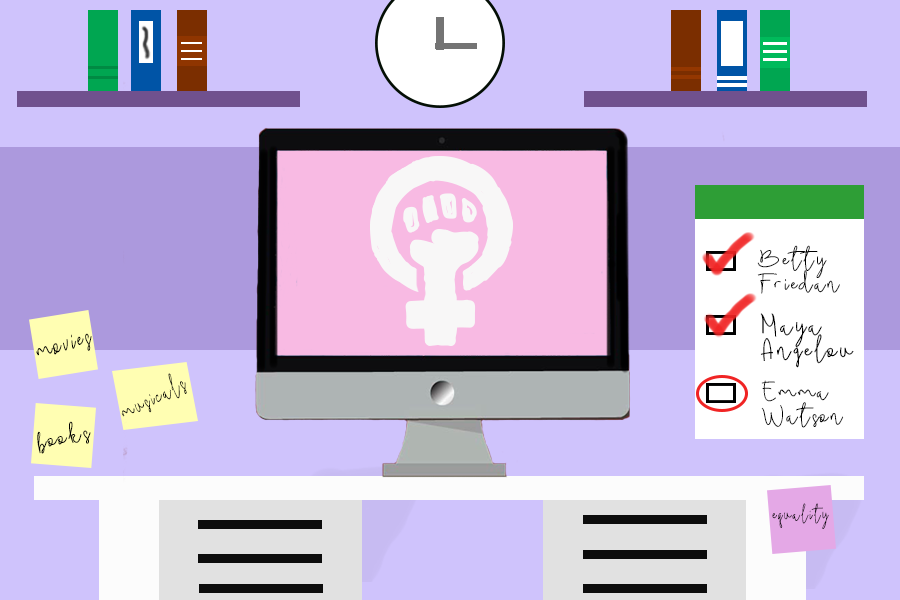Modern day feminism: How media has molded a movement
The Sidekick staff writer Jessica Hernandez discusses feminism and how it plays a role in media. Feminism can show itself in media in ways such as the critically acclaimed Broadway musical “Waitress”, Emma Watson’s U.N. Women partnership and much more.
April 19, 2018
From Broadway musicals to social media posts, feminism has become a central theme for thousands of stories that are being told every single day.
Although the definition of feminism varies from person to person, I see it as the advocating for equality of the sexes and the empowerment of women. At one point in time, women were unable to own land, make money or vote.
Now, women can do those things, but they still make less money than men. Women are still cheated of opportunities on a daily basis, are seen as inferior to men in certain practices and are often still tied to social norms surrounding gender.
More than anything, feminism is the unity of women for equality. As with any other movement, there are many stereotypes made about the people who support it. In this case, some think feminists hate men and wish they were more powerful than them. Those are just two of the many stereotypes that are often the furthest from the truth.
“Sometimes people have a very one-sided view of feminism but it’s important to recognize that there’s not just one type of woman,” Coppell High School senior Jennifer Nachazel said. “When you show up to events such as the Women’s March, you hear stories of many women that bring different issues that women face on a daily basis to light.”
“Waitress”, a critically acclaimed Broadway musical with songs written and later performed by Sara Bareilles, ran in Dallas from March 28 to April 8 at Fair Park. It follows the story of a young woman as she overcomes struggles and learns to take her life into her own hands, inspiring audiences and empowering young viewers.
“It’ll make you walk out of the theater believing that girl power is pervasive and it’s just the best feeling ever,” CHS senior Alli Feille said.
Backed with an all-female creative team, the show is also completely run by women, which is very unusual for a show on Broadway.
“The story is so focused on a woman trying to find her way through an abusive relationship as she makes a better life for herself and her baby,” Nachazel said. “Throughout the show, you begin to see her stop making excuses for (her husband) as she realizes that she is more than him and she can make her life more than it’s been.”
In 2016, Emma Watson, self-proclaimed feminist and role model for women around the world, launched her own feminist book club called Our Shared Shelf in partnership with U.N. Women. They began reading and discussing books monthly, but that has since changed to bi-monthly selections and discussions. With a following of over 210,000 readers from all over the globe, there is no shortage of relevant conversations within this group.
“What I love about the group is the shared aspect of it,” CHS librarian Lynn Hevron said. “When you share situations, it increases everyone’s awareness of it and heightens the level of conversation while raising consciousness and provides details that one might not know otherwise. More than anything, it’s just empowering.”
For the months of March and April, Watson’s selection was “Heart Berries” by Terese Marie Mailhot, a collection of essays focusing on overcoming struggles and finding your place in the world.
Despite these shows and books that promote strong feminist messages, women, especially girls, are still treated differently than men and boys. The norms have been ingrained into the very foundation of our country, beginning from the late 1700s to now, and there is much work that needs to be done to change them.
Just a few days ago, as I was volunteering to move chairs and tables for testing, eight boys were asked to help an administrator move something. With a look of disbelief on my face, I turned to see others offended and outright annoyed by such a comment.
What about my gender implies that I am unable to carry a heavy object?
The answer is simple: absolutely nothing.
Women, myself included, should not be seen as less than men. We should not be stereotyped because of who we are. No one should be made to feel ashamed of themselves because they are not up to society’s flawed standards. The only way these flawed ways of thinking can change is through media and discussion spurred from it.
“Feminism has definitely changed through social media because growing up, men were portrayed as the head of the household, but that has really changed over time,” Feille said. “Now, you hear more stories of women taking matters into their own hands. Women empowerment has become a big theme in our culture and I really admire that.”
With recent social media movements and the platforms that have been created online, future generations are sure to grow up knowing more about movements such as feminism. They are likely to grow up seeing women treated equally on TV, in movies and in the books that they read.
They are likely to pay their employees equal wages for equal work, grant opportunities to both men and women and raise their children in a more open-minded and inclusive manner.
“We, especially as Americans, have the platform and the right to share our opinions, and it’s important to do that because not everyone around the world does,” Nachazel said. “It’s important to share our opinions no matter what they are because we all disagree on things, but we should share them when we have the chance.”
Despite all of this progress, there is still work to be done. Currently, there are only 83 women serving in the House of Representatives, meaning that women make up merely 20 percent of the House. When compared to 1777, this is quite a feat, but considering that it is 2018 and the representation of men and women should be equal, this ratio still has a long way to go.
To achieve a true state of equality and reach the goal that feminism promotes, we need to keep our minds and our hearts open. Watching empowering musicals and reading feminist books barely scratch the surface of how the message of feminism is being spread through media.
Through the power of media in general, we can make messages clear and tell stories that can help us achieve equality in the future by teaching future generations that women are equal to men in every way.
“The future that I’d really like to see is an intersectional branch of feminism because inclusiveness is so important,” Nachazel said. “For a long time it was the white woman’s feminism or the straight woman’s feminism, but there’s so much more and I’m excited to see how people begin to bring their own voices into the movement.”











